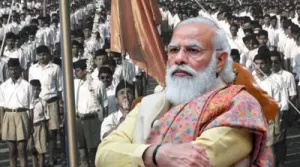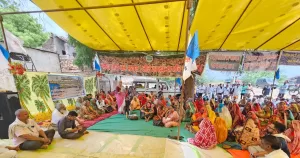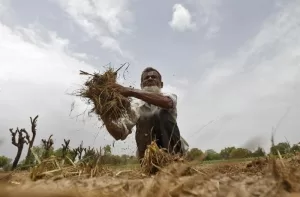Farmers’ Mann ki Baat
Sukumaran C.V.
Rulers who neither see nor feel nor know
But leechlike to their fainting country cling …
– P.B. Shelley
(sonnet England, 1819).
Two centuries ago, the great poet Shelley told the Peterloo protesters, Who were agitating for greater Reforms and who were confronted By the charging cavalry of King George: “Rise like Lions after slumber In unvanquishable number, Shake your chains to earth like dew Which in sleep had fallen on you- Ye are many- they are few.”[1] Oh! Farmers, you feed the nation, But the nation heeds you not; If you cultivate not, the doctor And the engineer will starve to death; But the doctor and the engineer live Better lives and you live miserably. If you cultivate not, the ruler and The bureaucrat will starve to death; But the ruler and the bureaucrat live Better lives and you live miserably. If you cultivate not, contractors and The brokers will starve to death; But the contractors and brokers live posh And you lead a life in misery. You feed everybody and nobody Listens to you and sees your woes. We are taught to be proud of being IAS and IPS people; never we are Taught to be farmers, not even to Appreciate them and their toil, Which enables us to have our posh style. Everybody wants to be bureaucrats; And nobody wants to be farmers. Yet, nobody can live without farmers! And when you walk together to Meet the Maharajas and tell them Your woes and your problems, They dig moats across roads to Stop you reaching around their City. They know not you are the children Of the soil and you can metamorphose into A placid yet turbulent river whose flow Their moats and barricades can’t stop. You left your villages and formed the river, That flowed and flowed and breached The moats and barricades and knocked on Their City gates and put the City under siege. Then the Maharajas put forth conditions; And you said to hell with the conditions. The rulers are not, but the people are The authority to put forth conditions. You taught them the bitter truth; And it will be better for them, To be wise enough to learn the truth. And they will be wiser, if they learn it. I feel proud of you when I see you Walk and cook and sleep on the roads; While the north Indian winter is unbearable, Even if we have a roof above our heads. I feel proud of you when I see you Stand united not by caste and creed; But by your economic woes whose Creators the corporate-friendly rulers are. I feel proud of you for telling the Maharaj You are bored to hear his mann ki baat, and For forcing him to listen to your mann ki baat. And I wish to be with you, to flow With you, to walk with you and To confront the Maharajas With you and to tell them that the World goes on only because you are There to saw and reap and feed it. And I wish to be with you to tell you: “Rise like Lions after slumber In unvanquishable number, Shake your chains to earth like dew Which in sleep had fallen on you- Ye are many- they are few.” Oh, No; We are many, they are few.
[1] Quoted from Shelley’s poem The Masque of Anarchy. [On August 16, 1819, cavalry regiments of King George III attacked the 60,000 protesters who were agitating peacefully for political reforms assembling in St. Peter’s Field, Manchester, led by the radical orator Henry Hunt. In the cavalry charge, around twenty people were killed and hundreds were injured. This incident is known as the Peterloo Massacre. Shelley wrote the poem lambasting the authorities. But it was published only after his death. Shelley lambasts the combination of power (God, and Law, and King) that oppresses the people. The fascinating and salient feature of the poem is its eloquent portrayal of non-violent resistance. Timothy Bloxam Morton says in his essay ’Receptions’ included in The Cambridge Companion to Shelley that the poem has played an important role in inspiring Gandhian non-violent resistance. See how beautifully and powerfully Shelley delineates non-violent resistance in the 79th, 84th, 85th and 86th stanzas of the poem:
Stand ye calm and resolute, Like a forest close and mute, With folded arms and looks which are Weapons of unvanquished war. (Stanza 79) And if then the tyrants dare, Let them ride among you there; Slash, and stab, and maim and hew; What they like, that let them do. (84) With folded arms and steady eyes, And little fear, and less surprise, Look upon them as they slay, Till their rage has died away. (85) Then they will return with shame, To the place from which they came, And the blood thus shed will speak In hot blushes on their cheek." (86)
(Sukumaran C.V. is a former JNU student and is based in Kerala. Article courtesy: Mainstream.)
❈ ❈ ❈
Father, We have Sinned
Rohan Deshpande
Father, we have sinned For you, The preambular values and Article 21 have been binned. As a society, we take selective outrage A journalist, yes Yet, denial of a sipper and straw is not met with enough umbrage. Your case may be under the UAPA, with the NIA prosecuting I say! Does that justify such a denuding? Delay defeats justice Is known to all alike But for you, the judiciary is cold as ice. A humanitarian request is not entertained For want of A reply to your plaint. I am instantly reminded of a picture Adorning the High Court at Panaji Depicting a chain around legal scriptures. With anguish, I propose one addition Nay, an amendment Clarifying that in our legal system, there’s no place for your kind of petition. Does no one understand – the only lock that a straw can pick Is what unshackles A monster who makes our Constitution and conscience sick. If this is the way we treat our octogenarians, I ask myself, Is there any place for my generation? However, be rest assured that your struggle for a sipper and a straw Will not go down in history, And equate you to a man of straw. For Father, while we have sinned In your case, Only the devil has grinned.
(Rohan Deshpande practices as a Counsel in the Bombay High Court and writes on law and current affairs.)




